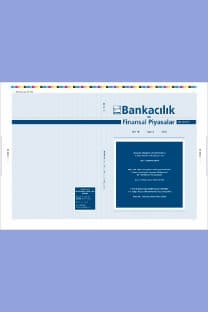An empirical investigation of the uncertain information hypothesis: Evidence from borsa İstanbul
Belirsiz bilgi hipotezi üzerine ampirik bir inceleme: Borsa İstanbul örneği
___
- Ajayi, R. A., and Mehdian, S. (1994). Rational Investors’ Reaction to Uncertainty: Evidence From The World's Major Markets. Journal of Business Finance and Accounting, 21: 533−545.
- Ajayi, R. A., Mehdian, S., and Perry, M. J. (2006). A Test of US Equity Market Reaction to a Surprise in an Era of High Trading Volume. Applied Financial Economics, 16: 461-469.
- Akkoc, S. (2003). Overreaction Hypothesis and an Empirical Study on the Istanbul Stock Exchange. Unpublished master’s thesis, Eskisehir Osmangazi University, Eskisehir, Turkey.
- Alonso, A. and Gonzalo, R. (1990). Overreaction in the Spanish Equity Market, Journal of Banking and Finance, 14 (2-3): 469-481.
- Atkins, A., and Dyl, E. (1990). Price Reversals, Bid-ask Spreads, Market Efficiency. Journal of Financial and Quantitative Analysis, 25: 535–547.
- Bloomfield, R., Libby, R., and Nelson, M. W. (2000). Underreactions, Overreactions and Moderated Confidence. Journal of Financial Markets, 3: 113-137.
- Bremer, M., Hiraki, T., and Sweeney, R. J. (1997). Predictable Patterns after Large Stock Price Changes on the Tokyo Stock Exchange. Journal of Financial and Quantitative Analysis, 32(3): 345–365.
- Brown, K. D., Harlow, W. V., and Tinic, S. M. (1988). Risk aversion: Uncertain Information, and Market Efficiency. Journal of Financial Economics, 22: 355−385.
- Brown, K. D., Harlow, W. V., and Tinic, S. M. (1993). The Risk and Required Rate of Common Stock Following Major Innovations. Journal of Financial and Quantitative Analysis, 28: 101−116.
- 10. Bush, P. J., Mehdian, S. M., and Perry, M. J. (2010). A Cross-Industry Analysis of Investors’ Reaction to Information Surprises: Evidence from NASDAQ Sectors. International Review of Accounting, Banking and Finance, 2(2): 85- 103.
- 11. Cootner (Ed.), P. H. (1964). The Random Character of Stock Market Prices. MIT Press, Cambridge, Massachusetts.
- 12. Cox, D. R., and Peterson, D. R. (1994). Stock Returns Following Large One- day Declines: Evidence on Short-term Reversals, Long-term Performance. Journal of Finance, 49: 255–267.
- 13. De Medeiros, O. R. (2005). Reaction of the Brazilian Stock Market to Positive and Negative Shocks. http://ssrn.com/abstract=868464.
- 14. DeBondt, W. F., and Thaler, R. H. (1985). Does the Stock Market Overreact? Journal of Finance, 40: 793−805.
- 15. DeBondt, W. F., and Thaler, R. H. (1987). Further Evidence on Investor Overreaction and Stock Market Seasonality. Journal of Finance, 42: 557−581.
- 16. Dickey, D. A. and Fuller, W. A. (1981). Likelihood Ratio Statistics for Autoregressive Time Series with a Unit Root. Econometrica, 49(4): 1057- 1072.
- 17. Erzurumlu, Y. O. (2011). Investor Reaction to Market Surprises on the Istanbul Stock Exchange. Dogus Universitesi Dergisi, 12 (2): 213-225.
- 18. Fama, E., (1965). The Behavior of Stock Market Prices. Journal of Business, 38: 34–105.
- 19. Fama, E. (1970). Efficient Capital Markets: A Review of Theory and Empirical Work. Journal of Finance, 25: 383-417.
- 20. Howe, J. S. (1986). Evidence on Stock Market Overreaction. Financial Analysts Journal, 74-77.
- 21. Mehdian, S., Perry, M. J., and Nas, T. (2008). An Examination of Investor Reaction to Unexpected Political and Economic Events in Turkey, Global Finance Journal, 18: 337-350.
- 22. Pettengill, G. N. and Jordan, B. D. (1990). The Overreaction Hypothesis, Firm Size, and Stock Market Seasonality, Journal of Portfolio Management, 16 (3): 60-64.
- 23. Pham, V. T. L., Nguyen, D. Q. T. and Tô, T. (2008). Abnormal Returns after Large Stock Price Changes: Evidence from Asia-Pacific Markets. In M. McKenzie, and S. Kim (Eds.), Asia-Pacific Financial Markets: Integration, Innovation and Challenges International Finance Review, 8: 205-227.
- 24. Rezvanian, R., Turk, R. S. and Mehdian, S. M. (2011). Investors’ Reactions to Sharp Price Change: Evidence from Equity Markets of the People’s Republic of China. Global Finance Journal, 22: 1-18.
- 25. Samuelson, P., (1965). Proof That Properly Anticipated Prices Fluctuate Randomly. Industrial Management Review, 6: 41–49.
- 26. Sevim, S., Yildiz, B., and Akkoc, S. (2007). Overreaction Hypothesis and an Empirical Work on the Istanbul Stock Exchange. Istanbul Stock Exchange Review, 9 (35): 21-36.
- 27. Shachmurove, Y. (2002). The Behavior of Secondary European Stock Markets to Positive and Negative Shocks. International Journal of Business, 7(2): 1-16.
- 28. Zarowin, P. (1989). Does the Stock Market Overreact to Corporate Earning Information? Journal of Finance, 44 (5): 1385-1399.
- ISSN: 1307-5705
- Yayın Aralığı: 2
- Başlangıç: 2007
- Yayıncı: Bankacılık Düzenleme ve Denetleme Kurumu
Gecelik kur takası faizleri ve BIST gecelik repo faizleri
Farklı para politikası rejimlerinde enflasyon belirsizliği ve enflasyon ilişkisi
Classification of turkish commercial banks under fuzzy c-means clustering
İsmail Hakkı GÖKGÖZ, Fatih ALTINEL, F. Pınar GÖKGÖZ YETKİN, İlker KOÇ
Belirsiz Bilgi Hipotezi Üzerine Ampirik Bir İnceleme: Borsa İstanbul Örneği
Türk Bankacılık Sistemindeki Bankaların c-Ortalamalı Bulanık Kümeleme Analizi ile Sınıflandırılması
İsmail Hakkı GÖKGÖZ, Fatih ALTINEL, F.pınar Yetkin GÖKGÖZ, İlker KOÇ
Yatırımcı duyarlılığı temsilcileri: Yatırım ortaklıkları iskontosu ve tüketici güven endeksi örneği
SERKAN YILMAZ KANDIR, Gözde ÇERÇİ, ÖNDER UZKARALAR
An empirical investigation of the uncertain information hypothesis: Evidence from borsa İstanbul
